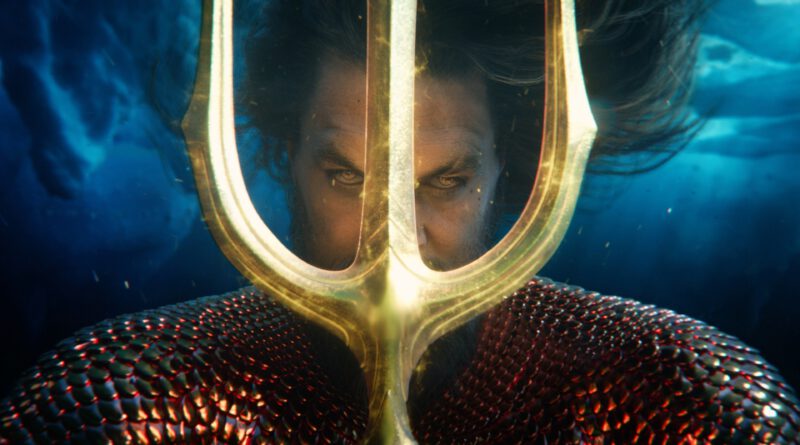‘Aquaman and the Lost Kingdom’ review: The death knell the DCEU deserves
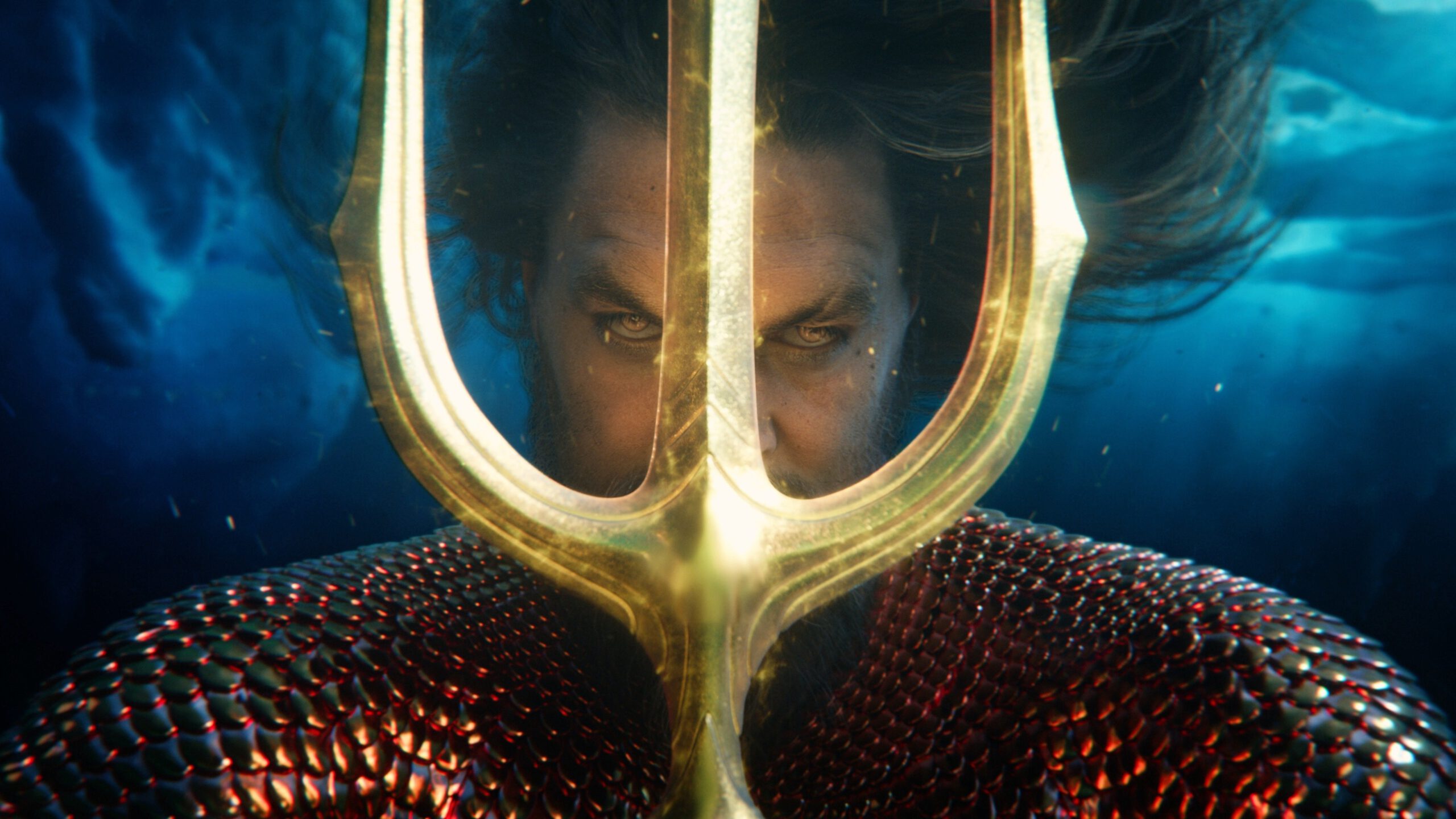
There couldn’t be a more appropriate way to end 2023, the year of superhero box office disappointments — Ant-Man and the Wasp: Quantumania, Shazam: Fury of the Gods, Blue Beetle, The Marvels — than James Wan’s floundering, mind-numbing Aquaman and the Lost Kingdom, which seems set to perform just as poorly. Gone is the Saturday morning cartoon sensibility of the first Aquaman, a fun (if half-baked) undersea romp that went on to gross a billion dollars. Ticket sales are by no means the arbiter of quality, but the tides are clearly turning. When it comes to big IP, mainstream audiences are no longer willing to settle for mediocre output, which would be a kind way to describe The Lost Kingdom.
The sequel plays, for the most part, like a retread of Wan’s first Aquaman, a 2018 Christmas hit. Arthur Curry (Jason Momoa) learns what it means to rule Atlantis — the hidden submarine kingdom, whose gripes with the surface involve real-world climate concerns — while fighting off the high-tech, bug-eyed Black Manta/David Kane (Yahya Abdul-Mateen II), a diver and mercenary out for revenge — who eventually makes way for a different villain. There’s even a desert detour en route to a secret throne, and a plot involving a powerful new trident, all of which culminates in a familiar battle involving numerous undersea factions. Jonathan Rhys Davies’ adorable crustacean ruler Brine King makes a brief but short-lived appearance too (give that man his spin-off).
But if The Lost Kingdom follows the first film’s formula this closely, then it ought to be easy to replicate its delights. Instead, it discards most of what made Aquaman enjoyable and replaces it with dead air, tonal dissonance, and a complete lack of filmmaking energy, making it a fitting closing chapter to the decade-long failed experiment that was the DCEU.
What is the plot of Aquaman and the Lost Kingdom?
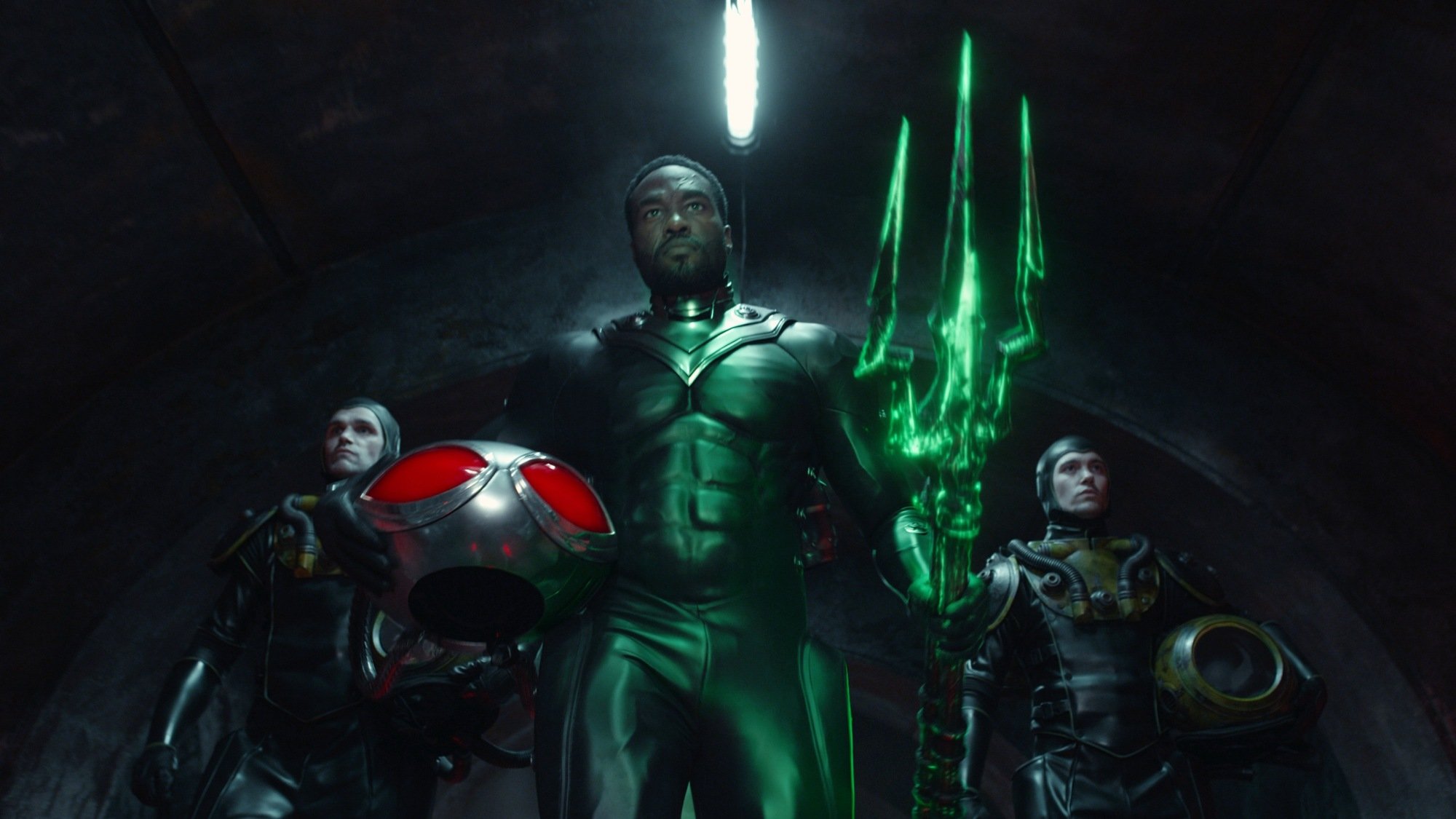
The film’s opening has immense promise with hints of the kind of silliness that makes Wan’s movies work. (See also: his gonzo horror pastiche Malignant.) The prologue sees Aquaman astride a giant, glowing seahorse as he advances to knock some pirate heads together. This re-introduction — during which Momoa muses philosophically: “They say everybody’s good at something. Me? I talk to fish” — is the closest The Lost Kingdom comes to capturing the first film’s Lisa Frank pencil case energy. It even doubles down by revealing the whole scene to be a recollection by Aquaman, narrated to his newborn son, Arthur Jr., which he re-enacts with action figures, hinting further at a childlike spark.
Unfortunately, that’s as far as the movie gets before things start to fall apart. As Aquaman gets us up to speed on recent developments, the ensuing montage has the oily fingerprints of strange re-workings, as though it were edited to excise Amber Heard’s Mera (his baby’s mother) from the picture, as well as Nicole Kidman’s Atlanna (his own mother), despite the last film’s dual romantic ending. “To single parents,” he toasts his father, the lighthouse keeper Tom (Temuera Morrison), as he reflects on the joys and challenges of raising his son. Where are their respective wives? Did they die? Did they abandon the Curry fathers? The answer, it turns out, is neither of the above: they both show up before long, almost at random, despite barely featuring in this bizarre opening.
It’s one of the rare superhero movies made immediately worse by watching it with a crowd.
The film’s villainous plot is, at least, marginally more coherent, though it lacks originality. While scavenging for undersea technology to fix his battle armor, Manta — with the help of the bumbling, Atlantis-chasing, surface scientist Dr. Shin (Randall Park) — stumbles upon the remnants of an undersea kingdom frozen in ice, which is starting to thaw thanks to global warming. In these enormous, icy caverns, he discovers Lovecraftian monsters and two halves of a magical triden. When connected, they give him flashbacks and visions of an imposing, ancient villain, Kordax, shrouded in green flames, who tempts him with power in exchange for his resurrection. To take inspiration from The Lord of the Rings would be one thing — it is, after all, a modern fantasy touchstone — but The Lost Kingdom’s approach is lazy. Kordax isn’t just Sauron-esque, but rather, Sauron in all but name and color scheme, with a zombified face practically pasted onto the Middle Earth megalomaniac’s spiked metallic mask.
Manta’s new weapon, the Black Trident, imbues him with all the power of Kordax’s evil spirit (à la the One Ring) as he makes a deal with this devil, though the specifics aren’t quite clear. Manta gets to kill Aquaman, while Kordax gets to be freed from his icy prison, resulting in the resurrection of his long-dormant kingdom. The designs of which are ripped straight from Peter Jackson’s conception of Mordor and Minas Morgul, albeit without the grandeur or scale. The murkiness surrounding this scheme isn’t so much mysterious as it is confusing. Not only is it unclear as to whether the frozen city Manta discovers is Kordax’s lost kingdom — or some other place his trident happened to be — but also his bargain for unlimited power is thoroughly uninteresting, since it doesn’t seem to be a bargain at all. He and the disembodied Kordax seem to want all the same things, for reasons later revealed.
This lack of dramatic intrigue plagues Aquaman’s story too. While it’s amusing to see him be bored by the bureaucracy of underwater rule (a royal council won’t let him take radical action), this never quite results in meaningful stakes when he goes against their whims in secret. When Manta’s plot is discovered, Aquaman decides to stage a jailbreak from a desert prison and free his brother Orm (Patrick Wilson), the first movie’s villain. However, going against the wishes of Atlantean politicians is remarkably easy in both decision and execution. It would be foolhardy to demand a more rigorous political inquiry into the mechanics of aquatic rule, but there’s no sense of risk or mischief involved either. Aquaman freeing Orm from the clutches of half-dead, dried up, skeletal mermen comes far too easily. It also lessens the impact of having zombie mermen be third-act villains later, since the two are somehow unrelated, but are dispensed with just as casually.
The action in Aquaman and The Lost Kingdom is rarely fun.
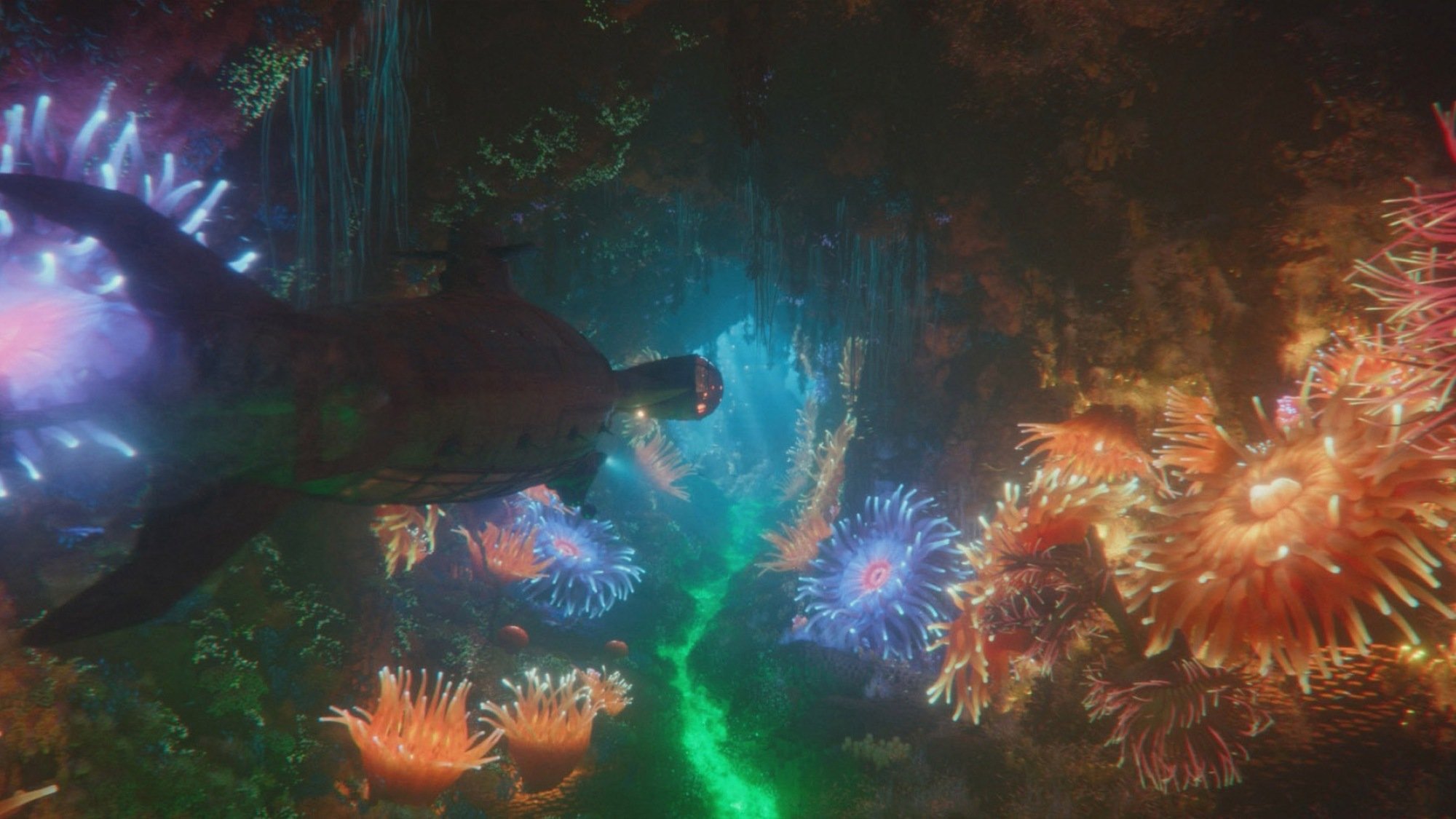
As Manta and Aquaman weave in and out of each other’s paths, a handful of action scenes ensue, but they seldom take advantage of the film’s unique premise. No matter where each scene is set, no matter how deep under the ocean, there’s usually some convenient air pocket or submarine bridge to be found. Despite the movie’s occasional underwater chases, with bright ships and vehicles shaped like turtles, sharks, and starfish, there’s a shocking lack of creativity at play, as the characters clang tridents and shoot each other with laser guns as if this were just another superhero movie set on land.
Wan usually has a remarkable eye for cartoonish action. His wide, short-lensed tableaus on Aquaman, Furious 7, and Malignant gave each action set piece a sense of exaggeration every time the camera swung around the characters in fluid, unbroken takes. It always felt larger than life. The Lost Kingdom employs this technique only once, in the climax, during which point it’s already hard to tell which scenes are unfolding underwater and which ones are above ground, given how indecipherable their physics tend to be.
Apart from the odd instance of Aquaman communicating with undersea life, as concentric ripples emanate from his forehead like in an episode of Super Friends, water never seems to have a physical texture that allows the undersea action to take shape visually. There’s little sense of weight or impact involved, and there’s a shocking lack of set pieces or action beats that feel specific to the movie’s setting. Having your characters float underwater, practically freed from gravity, with an entire world of sea creatures and unique geography at their disposal is an invitation to let loose and have fun, but The Lost Kingdom is far too restrained and unimaginative.
The first Aquaman had plenty of land-set scenes, but even those leaned hard into the film’s Looney Tunes acrobatics and acoustics, like the scene where Manta knocks his head on a giant bell with an exaggerated THUD before plummeting off a cliff with a Wile E. Coyote whistle. But The Lost Kingdom has an odd and off-kilter seriousness to it, despite its litany of jokes — the Rosetta stone for which can be boiled down to one specific moment. In the first film, practically every conversation was interrupted by an explosion, a running gag (intentional or otherwise) that became its de facto signature. This happens in The Lost Kingdom, but only once, and the characters immediately draw attention to it with snarky commentary, as though they were ashamed to be in an Aquaman movie.
The comedic tone of Aquaman and the Lost Kingdom is completely wrong.
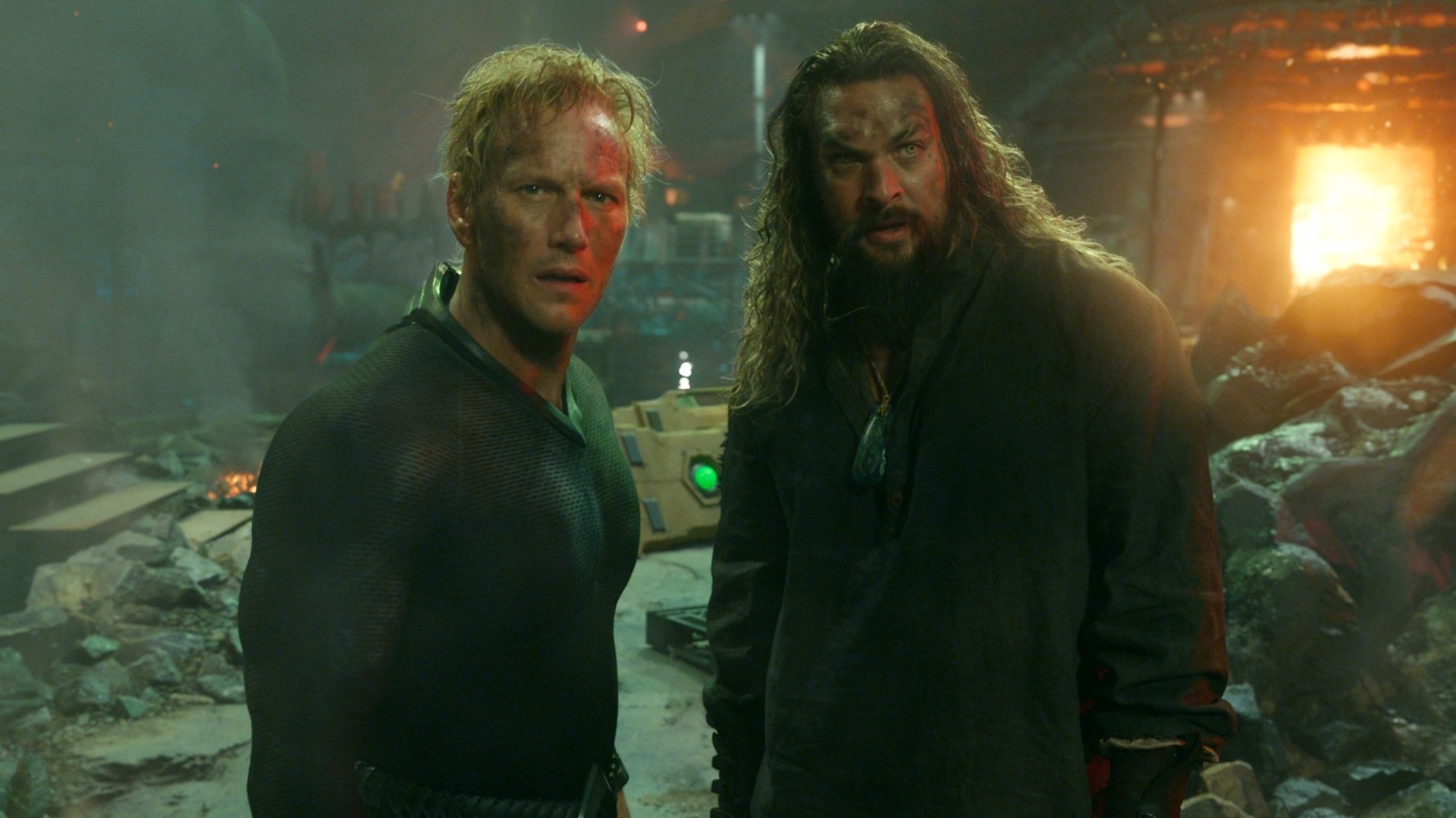
A frequent criticism of the Marvel Cinematic Universe is its snarky quips that make every character sound like Iron Man. The Lost Kingdom suffers from this problem, despite Aquaman having been a much more laid-back character in previous appearances. He was always excitable when it mattered; his exclamations of “YEAYUH!” and “MAH MAN!” were the highlights of Justice League. Momoa, however, performs this version of Arthur Curry with a Fast X energy, casually disconnected from any sense of consequence, as though he were above the film, rather than in it.
On the other hand, supporting actors like Kidman, Wilson, and a returning Dolph Lundgren are fully tapped into what this movie is (or what it ought to be). The plot revolves around Manta gathering a secret, destructive undersea material called “Orichalcum,” a made-up mouthful that sounds delightfully silly coming out of any straight-faced performer. But any hint of camp is usually interrupted by Aquaman’s now Deadpool-esque self-awareness. Rather than setups or punchlines, his “jokes” usually involve listing off different foods.
Meanwhile, Wilson makes for a hilariously dialed-in comedic straight man, a once regal character laid low by his own actions as he walks the road to redemption. Momoa, as his ostensible foil, is deeply uncomfortable to watch, with irreverent commentary that never lands, and only serves to make Aquaman feel anything but invested in the movie’s action and drama. Worse yet, none of this is helped by the awkward editing at play, which seems to leave extended, empty gaps between dialogue as though each line were meant to invoke laughs that never arrive. It’s one of the rare superhero movies made immediately worse by watching it with a crowd.
Most shots feel like they last too long — the opposite problem of a lot of modern Hollywood action — leaving too much dead air without humor, tension, or chaos. At over two hours in length, The Lost Kingdom becomes punishing to sit through, as you wait for something of note to happen, something to grab you or delight you, only nothing ever does. Worse yet, the 3D presentation (should you choose to opt for it) causes its digital sheen to stick out even more sorely, with unreal underwater effects that, when coupled with a strangely dim palette applied to lively underwater societies, make it even more of an eyesore.
Aquaman and the Lost Kingdom is ugly in appearance, and dispiriting in its conception of a fun character inhabiting a potentially whimsical world. It’s a nothing movie for no one. A decade from now, there’s a good chance it’ll be regarded as one of the final nails in the coffin of this era of glum, half-hearted superhero productions. In which case: good riddance.
